 A child receives routine immunizations in Mogadishu, Somalia, August 2023. Photo credit: WHO/I. Taxta14 February 2024 – A new investment case shows that successful polio transition in the 8 priority countries of the WHO Eastern Mediterranean Region will have a very high return on investment.
A child receives routine immunizations in Mogadishu, Somalia, August 2023. Photo credit: WHO/I. Taxta14 February 2024 – A new investment case shows that successful polio transition in the 8 priority countries of the WHO Eastern Mediterranean Region will have a very high return on investment.
Economic and social benefits totalling an estimated US$ 289.2 billion arise from sustaining polio assets and integrating them into expanded immunization, surveillance and emergency response programmes in 8 countries of the Eastern Mediterranean Region, the study reveals. As the present cost of this work is US$ 7.5 billion, this means that for every dollar spent, the return on investment is nearly US$ 39.
WHO commissioned the Victoria Institute of Strategic Economic Studies, Australia, to conduct the study, which is the first of its kind. It covers 8 polio transition priority countries in the Region: Afghanistan, Iraq, Libya, Pakistan, Somalia, Sudan, Syria and Yemen. Many of these countries are fragile, with challenges ranging from weak health systems and low routine vaccination coverage to political instability.
For years, the Global Polio Eradication Initiative has provided substantial technical and financial support in these settings. As we get closer to eradication, it is vital to secure long-term investments to ensure that countries sustain and further strengthen their immunization, disease surveillance and outbreak response capacities. These capacities are necessary to sustain a polio-free world, and at the same time build resilience and deliver improved health outcomes.
As Dr Rana Hajjeh, Director of Programme Management at the WHO Regional Office for the Eastern Mediterranean, highlighted: “We at WHO emphasize the importance of strengthening essential programmes, like the national routine immunization programme, and also strengthening emergency response to take advantage of all the polio assets, and building health systems.”
The Victoria Institute of Strategic Economic Studies study employs projections of ongoing costs and estimates of lives saved through the Region’s essential immunization, surveillance and emergency response programmes. It uses these to develop benefit–cost ratios that show the value of continuing to invest in these programmes.
Given limitations, including availability of data at the country level, a very conservative approach was used for this investment case, focusing mainly on surveillance and emergency response for outbreaks caused by vaccine-preventable diseases. Hence the actual return on investment is much higher.
The study results show a high return on investment, making a strong case for national governments, partners and stakeholders to continue to sustain these public health functions.
Key findings of the study
A US$ 38.70 return for every dollar spent on expanding national immunization programmes to achieve the Immunization Agenda 2030 targets.
A US$ 36.40 return for every dollar spent on strengthening surveillance and emergency response programmes by repurposing polio programme assets.
An overall projected return of US$ 289 billion against an investment of US$ 7.5 billion in baseline costs to sustain immunization, surveillance and outbreak response functions.
Table 1. Investment case for polio transition in the Eastern Mediterranean Region: benefit–cost ratios for immunization, surveillance and emergency response, 8 countries, 2021–2030
|
Economic benefit (US$, millions) |
Social benefit (US$, millions) |
Economic and social benefits (US$, millions) |
Cost |
economic |
Benefit–cost ratio, |
|
|
Routine vaccination |
158 069.6 |
104 657.0 |
262 726.6 |
6 783.1 |
23.3 |
38.7 |
|
Surveillance and emergency response |
13 454.0 |
12 995.9 |
26 449.8 |
726.5 |
18.5 |
36.4 |
|
Overall result |
171 523.6 |
117 652.9 |
289 176.4 |
7 509.6 |
22.8 |
38.5 |
At the 154th session of the WHO Executive Board, the outgoing WHO Regional Director for the Eastern Mediterranean Region Dr Ahmed Al-Mandhari drew attention to these findings: “We have conducted an investment case to mobilize resources for longer-term sustainability of public health functions. Investing in polio transition in the priority countries of the Eastern Mediterranean Region provides a return of US$ 39 for every US$ 1 invested and highlights the economic value and social benefits of sustaining polio assets and integrating them into national health systems.”
In the wake of the COVID-19 pandemic, the study offers clear evidence of the need for a successful and sustainable polio transition in the Eastern Mediterranean Region. National governments, donors and other stakeholders must now seize the opportunity to use these assets to build strong, equitable and resilient health systems.
 View the full polio transition investment case
View the full polio transition investment case








